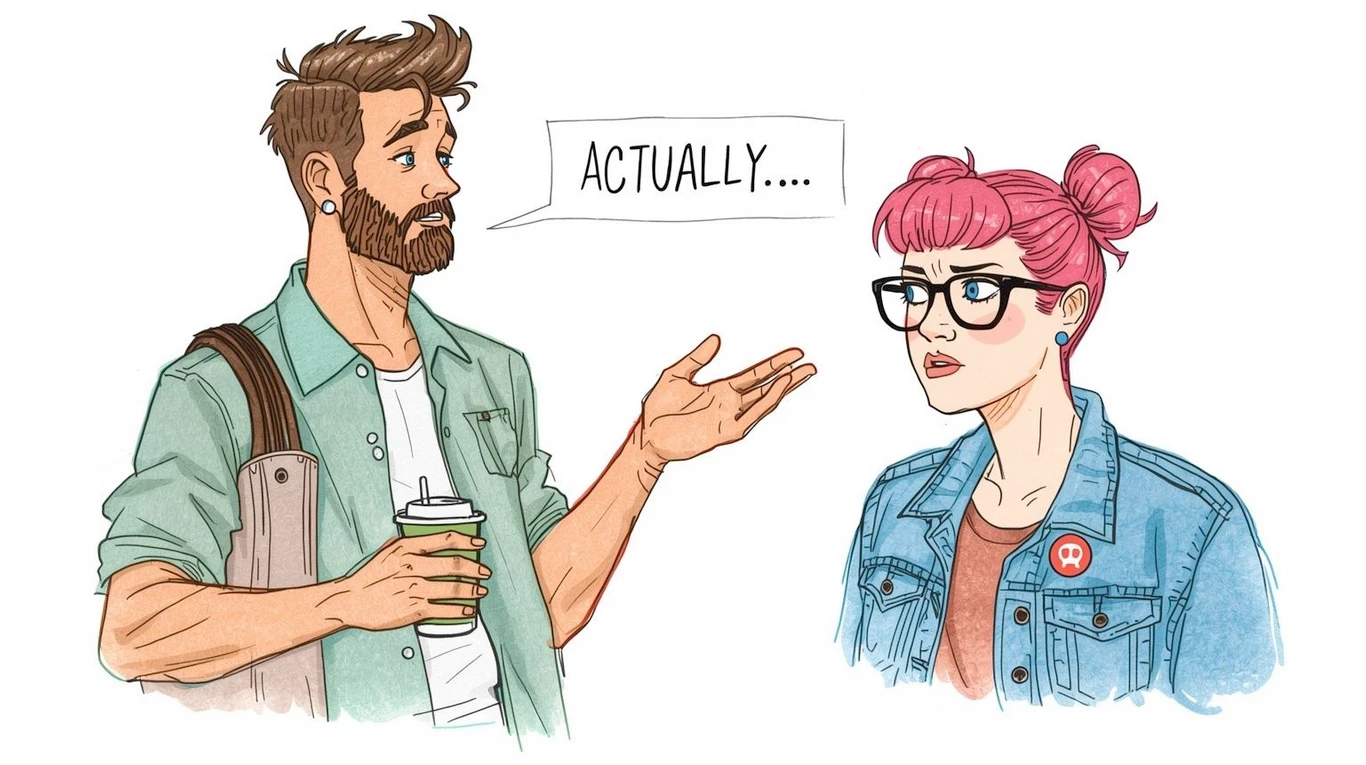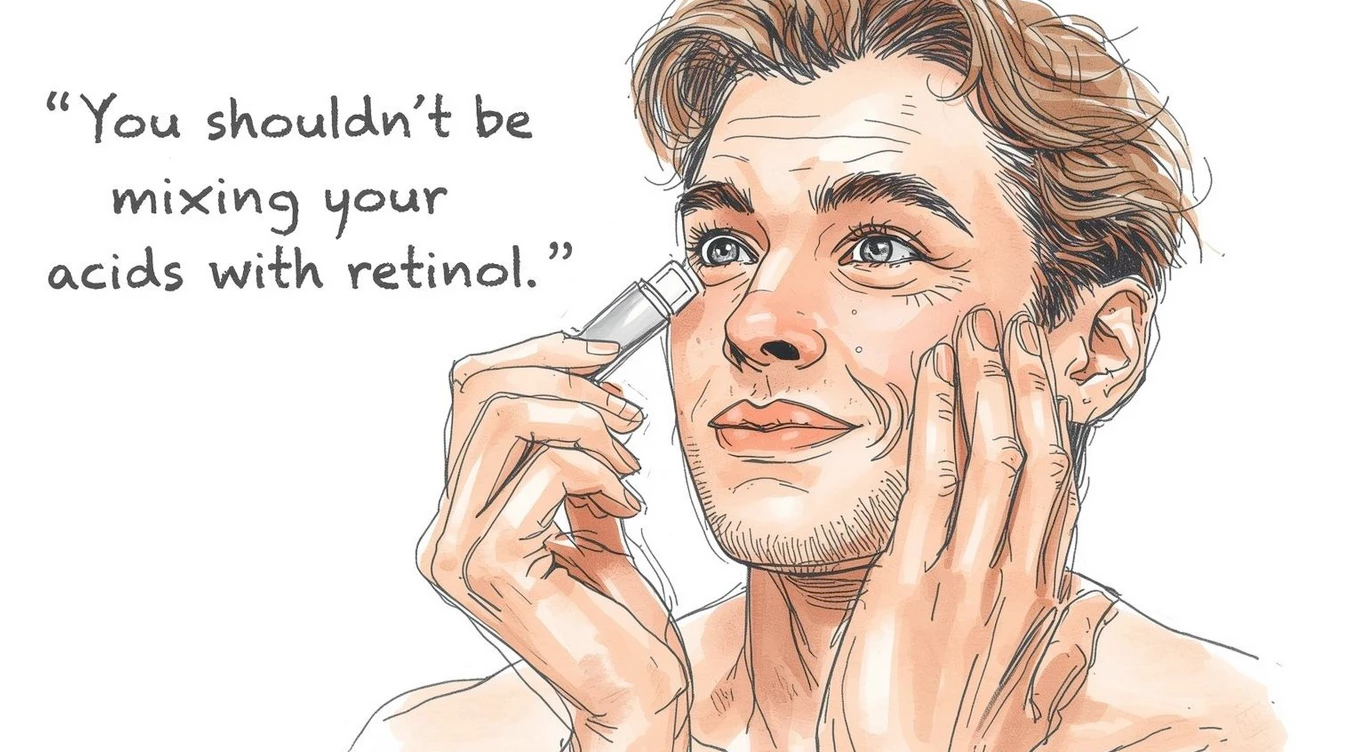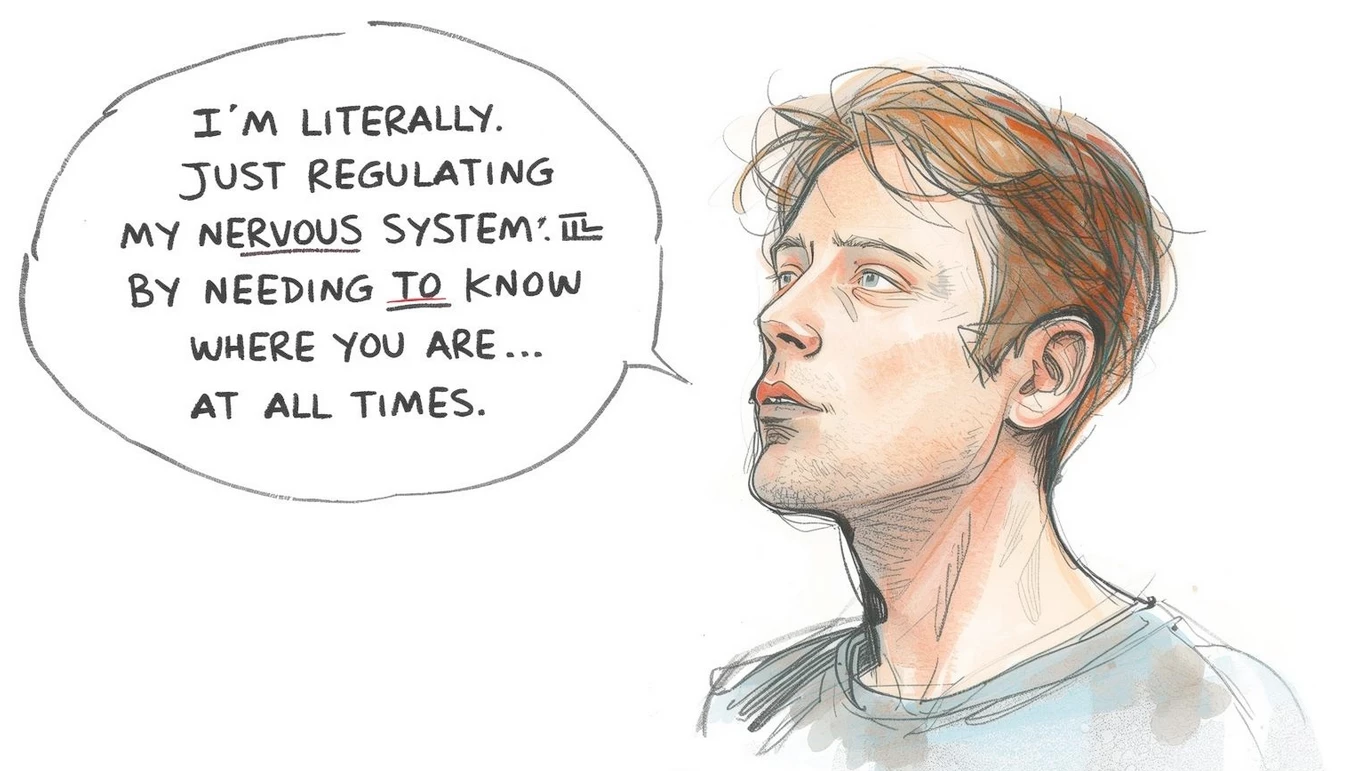What Is a Performative Male? The Internet's Latest Dating Red Flag
- 0 Collect
- 1 Like
- 1416 Read
- Report


The "performative male" has become 2025's most debated dating archetype—but what does it actually mean, and should you be worried?
If you've spent any time on TikTok or Instagram lately, you've probably encountered the term "performative male." Maybe you've seen the memes about guys clutching matcha lattes and tote bags, or videos mocking men who suspiciously pull out feminist literature in public spaces. The discourse has sparked everything from performative male contests in major cities to heated debates about whether we're unfairly stereotyping men who genuinely embrace progressive values.
So what exactly is a performative male, and is this just another internet trend destined to fade into obscurity alongside other dating archetypes? Let's unpack this phenomenon and what it reveals about modern masculinity, dating culture, and our collective exhaustion with inauthenticity.
What Is a Performative Male?
A performative male is a specific type of guy who adopts traditionally feminine interests, progressive political stances, and emotionally sensitive behaviors—not out of genuine conviction, but as a calculated strategy to appeal to women. Think of him as the male equivalent of the "pick me girl," performing a curated version of enlightened masculinity while his actual values remain frustratingly traditional.
The performative male definition goes beyond simply having diverse interests. We're talking about someone who loudly broadcasts their feminist credentials unprompted, strategically reads Bell Hooks in coffee shops with the cover prominently displayed, and name-drops therapy in every conversation—all while potentially harboring the same controlling tendencies and problematic attitudes they claim to have transcended.
ing men from enjoying matcha lattes or listening to Clairo. The issue lies in the intent. Are these interests genuine, or are they props in an elaborate mating ritual designed to exploit what women say they want in partners?
The Performative Male vs. Positive Masculinity
The problem with the performative male phenomenon is that it risks undermining actual progress toward healthy masculinity. When we become cynical about men who engage with therapy, express emotions, or embrace interests outside traditional male gender roles, we potentially discourage the exact behaviors that lead to positive masculinity.
The difference between authentic and performative behavior isn't always visible from the outside. A guy reading feminist theory might be genuinely educating himself—or he might be engaging in masculine posturing disguised as progressivism. The real test comes in private: Does he actually respect women's autonomy, or does he morph into one of those controlling men once the relationship is established?
Many women report that their "woke" boyfriends eventually revealed themselves to be abusive men who simply weaponized the language of therapy and emotional intelligence. They attended men's support groups and talked about their anger issues, but ultimately used this vocabulary to manipulate rather than grow.
How to Spot a Performative Male
So how do you distinguish between a genuinely evolved man and someone performing gender roles for strategic advantage? Here are some red flags to keep an eye out for:
The Unprompted Feminist Monologue: He makes sure you know about his progressive politics before you've even asked. His masculine identity is built around not being like other guys—which he'll tell you about constantly.
Aesthetic Over Action: His apartment has all the right books (spine out, naturally), but can he actually discuss them? Does his support for women's rights extend beyond social media posts into his actual behavior with female colleagues and partners?
Selective Sensitivity: He's extremely in touch with his emotions when discussing his own feelings, but dismisses yours. He might talk about men and therapy constantly, yet exhibits classic nice guy syndrome when rejected—that seething resentment disguised as wounded sensitivity.
The Savior Complex: He positions himself as different from toxic masculinity, alpha male behavior, and bro culture—but this often manifests as condescension toward both traditional men and the women they date. It's masculine bravado wearing a tote bag.
Inconsistent Values: He criticizes traditional masculinity and grind culture publicly but privately obsesses over protein obsession, male body image, and male thirst traps. He mocks money flexing while carefully curating content that showcases his success.
What Are the Performative Male's Hobbies?
The stereotype has crystallized around specific interests and aesthetics, though it's crucial to remember that enjoying these things doesn't automatically make someone performative:
Iced matcha lattes: The drink has become the unofficial performative male beverage of choice, replacing craft beer as the beverage that signals cultural awareness.
Female indie artists: Particularly Clairo, Laufey, Beabadoobee, and similar musicians. The key isn't listening to them—it's making sure everyone knows you listen to them.
Feminist literature: Sally Rooney novels, Bell Hooks, and Sylvia Plath—prominently displayed and frequently referenced.
Vinyl collecting: Because nothing says "I'm cultured" like an expensive, impractical format for consuming music.
Vintage and thrifted fashion: Baggy jeans, tote bags, and wired headphones as deliberate aesthetic choices that signal thoughtfulness and environmental consciousness.
Skincare routines: The performative male has embraced male vanity and male beauty standards, but often frames it through the lens of self-care rather than simple grooming.
Astrology: Knowing your birth chart and being fluent in Mercury retrograde discourse.
Therapy speak: Casually dropping terms like "attachment styles," "emotional labor," and "setting boundaries" in everyday conversation.
Again, none of these interests are inherently problematic. The issue arises when they're adopted as costume pieces rather than genuine passions. It's the difference between a man who appreciates modern masculinity's expanded definition and someone who sees it as a dating strategy.
Masculinity in Crisis
To understand the performative male, we need to zoom out and examine the current state of masculinity crisis in general. Men today face contradictory pressures: traditional manhood definition has been rightfully criticized for promoting emotional repression and dominance, but what replaces it remains contested territory.
The male loneliness epidemic is real. Men report fewer close friendships, less emotional support, and increasing isolation. Some respond to this by doubling down on traditional masculinity—the world of motorcycle culture, fishing culture, locker room talk, and fraternity culture where the real man definition requires stoicism and dominance.
Others swing to the opposite extreme: incel culture, where resentment toward women and society curdles into something dangerous. These men have given up on meeting women's stated preferences because they've decided those preferences are lies designed to favor genetically superior men.
The performative male represents a third response: meeting women's stated preferences not through actual change, but through strategic performance. He's absorbed the criticism of alpha male behavior without actually interrogating his own attitudes. He understands that Christian masculinity and other conservative frameworks are being questioned, so he adopts the language of progressivism while maintaining many of the same underlying assumptions about what makes a man.
In some ways, the performative male is responding to real confusion about masculine identity in the 21st century. If traditional definitions are out, and there's no clear alternative, why not simply perform whatever seems to work? The problem, of course, is that performance eventually fails when intimacy demands authenticity.
The Wounded Masculine and Male Midlife Crisis
The concept of the wounded masculine—the idea that men carry collective trauma from rigid gender expectations—helps explain why some men struggle to move beyond performance. They've been taught that showing vulnerability is weakness, that sensitive men don't deserve respect, that the only path to masculine success is dominance and control.
When these men encounter progressive ideas about masculinity, they sometimes adopt them intellectually without doing the deeper emotional work required for genuine transformation. They learn the words but not the music.
This dynamic often intensifies during male midlife crisis, when men who've built their identity on traditional success markers (career, status, physical prowess) confront mortality and meaning. Some respond by intensifying their commitment to performance—whether that's grind culture and money flexing, or pivoting to the performative male aesthetic if they believe that's what's now socially rewarded.
The tragedy is that many of these men might benefit enormously from real engagement with men and therapy, men's support groups, and honest examination of their anger issues. Instead, they weaponize the language of healing while avoiding the vulnerability that actual healing requires.
The Seduction Community Connection
The performative male shares DNA with the seduction community—that corner of the internet obsessed with "game," manipulation tactics, and reducing human connection to formulaic strategies. Both see relationships as problems to be solved through the right performance instead of contexts for genuine connection.
Where the seduction community once taught negging and peacocking, the performative male has updated the playbook for progressive audiences. Instead of demonstrating higher value through masculine bravado, he demonstrates it through feminist credentials. Instead of peacocking with outlandish fashion, he peacocks with carefully curated vulnerability and cultural sophistication.
The underlying mindset is the same: women are puzzles to be solved, and authenticity is less important than effectiveness. This transactional approach to relationships inevitably fails because people aren't actually fooled indefinitely by performance, no matter how sophisticated.
Are We Being Too Harsh?
Critics of the performative male discourse argue that we're essentially damning men whether they embrace traditional masculinity or try to change. Like traditional masculine behaviors? You're reinforcing patriarchy. Adopt progressive values? You're probably just performing for female attention.
This criticism has merit. The danger of the performative male meme is that it makes any man who steps outside traditional male gender roles suspect. It suggests that authenticity can only be found in not trying—a paradox that leaves men with no clear path forward.
Moreover, the focus on spotting and mocking performative males may distract from the genuine problem: abusive men and controlling men exist across the political and aesthetic spectrum. A guy who reads Jordan Peterson and lifts weights might be wonderful and respectful. A guy who attends BLM protests and loves Phoebe Bridgers might be manipulative and cruel. The surface indicators don't really tell you much about a person’s character.
Some scholars argue that all gender performance is, well, performance. Judith Butler's foundational work on gender theory suggests that there's no "authentic" gender expression underneath the performance—we're all constantly performing gender according to social scripts. From this perspective, criticizing the performative male for performing masculinity misses the point: everyone performs gender, and perhaps we should focus on whether those performances cause harm rather than whether they're "authentic."
How to Become a Performative Male (If You Really Want To)
Look, I'd be wrong if I didn't acknowledge that some of you are reading this thinking, "But I genuinely like matcha and Clairo—am I accidentally a performative male?" Or perhaps, more cynically, "This actually sounds like an effective dating strategy."
For those genuinely wondering if their interests make them performative, here's the test: Would you still engage with these interests if they provided zero social benefit? Do you genuinely enjoy reading feminist theory, or do you just like being seen reading it? Are you actually interested in emotional growth, or do you just like the way "I'm in therapy" sounds on dating apps?
If you're in the second category—contemplating adopting the performative male aesthetic as strategy—I'd suggest this approach is likely to backfire. People are generally better at detecting inauthenticity than you think, and even if you successfully perform your way into a relationship, maintaining that performance long-term is exhausting. Eventually, your actual values and preferences will emerge, and if there's a significant gap between the performed and the real, the relationship will crumble.
What This All Means for Modern Dating
Everyone's performing to some degree—the question is whether that performance reflects or contradicts your actual values.
For women navigating dating, the performative male offers a framework for questioning whether stated values align with actual behavior. Does his feminism extend to doing his share of household labor? Does his emotional sensitivity include respect for your boundaries? Does his progressive politics translate to action, or just aesthetics?
For men, this discourse demands introspection about motivation. Are you engaging with ideas about healthy masculinity because you genuinely believe in equality and want to grow? Or are you simply rebranding traditional masculine goals (sexual access, status, control) in progressive language?
The what is a performative male question ultimately points to deeper issues about what authenticity means in relationships, how we signal values and identity, and whether it's possible to "fake it till you make it" with personal growth and political commitments.
Beyond Performance
Perhaps the most useful reframe is to stop thinking about masculinity as something to perform at all—whether traditionally or progressively. What makes a man isn't sticking to any particular aesthetic or political framework; it's the capacity for self-awareness, growth, genuine respect for others, and alignment between stated values and actual behavior.
The real man definition we need isn't about protein shakes or therapy appointments, motorcycle culture or tote bags. It's about emotional honesty, accountability, and the courage to be actually vulnerable instead of performing vulnerability as a strategy.
Men struggling with the male loneliness epidemic need actual connection, not performance tips. Those dealing with anger issues need real therapeutic work, not just the language of therapy. The path through the current masculinity crisis isn't found in any particular aesthetic but in the hard, unglamorous work of becoming someone whose actions align with their words.
As for spotting performative males? Trust your instincts about consistency over time. Words are cheap; patterns of behavior reveal character. Someone can have every signifier of the performative male without being manipulative, and someone can avoid all those signifiers while being deeply respectful and genuine.
The internet loves neat categories and quick identification guides, but human beings remain stubbornly complex. Maybe the guy with the matcha and the Clairo vinyl genuinely loves both. Maybe the guy who's never heard of Bell Hooks treats his partner with profound respect and equality. Surface signals only tell you so much.
The real question isn't whether someone fits the performative male profile—it's whether they treat you with consistent respect, demonstrate genuine growth, and create space for authentic connection instead of performing a role they think will win approval.
And if you're a guy reading this wondering whether you're performative? Ask yourself: Are you trying to be good, or just look good? The answer to that question matters more than your drink order.







